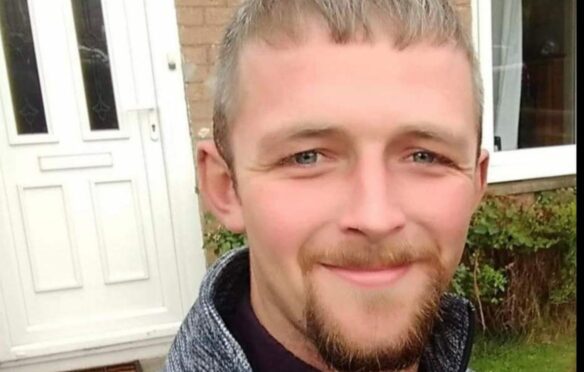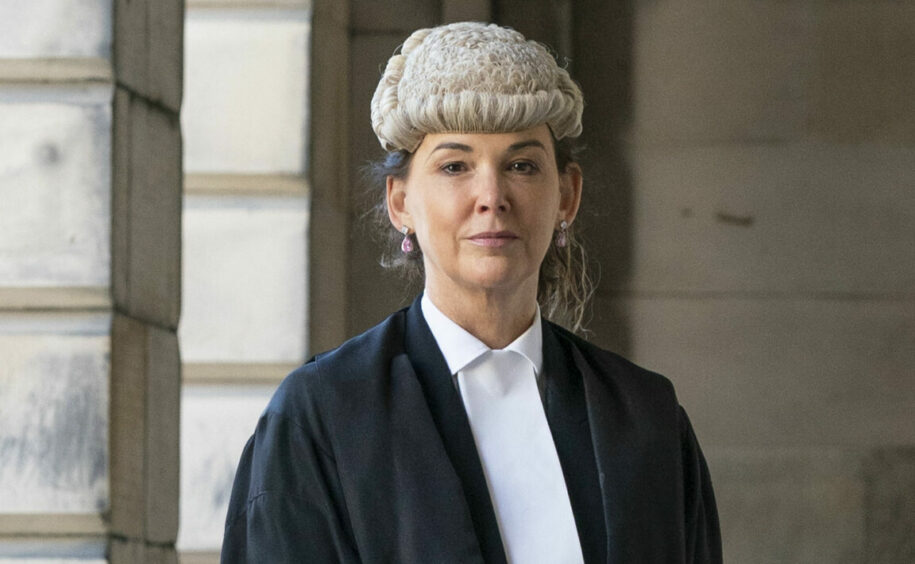
A triple rapist jailed for just a year for attacking his first victim has had his sentence substantially increased.
Ruaraidh McCartney’s first victim, Carrie Davidson, said the Appeal Court decision to increase his overall sentence from eight to 13 years was a huge relief after experts said he posed a serious risk to women.
The baby-faced monster beat Carrie into unconsciousness twice during a three-hour ordeal more than eight years ago, leaving her for dead in a blood-spattered room.
Carrie believes her life was only saved because her anguished mother summoned police to rescue her.
Court papers released following the end of the appeal warned McCartney posed a “serious ongoing risk” to women because of his escalating violence, that he had a hatred of women, and gained sexual excitement by inflicting pain.
In August McCartney, 30, was sentenced to eight years in prison after being found guilty of a number of serious sexual offences between 2011 and 2021. The judge, Lord Alan Summers, jailed him for just one year for raping Carrie because he was under the age of 25 at the time.
But Lord Advocate Dorothy Bain appealed against McCartney’s sentence, arguing this should not have been a sentencing consideration, because he was aged “between 25 and 27” at the time of some of the offences.
Bain also argued Lord Summers failed to properly consider the risk McCartney posed, and that the attacker had shown no remorse.
The Appeal Court judges – Lady Dorian, Lord Matthews and Lord Boyd of Duncansby – said they acted for “protection of the public from serious harm”.
They said: “We will quash the sentence and impose an extended sentence of 13 years consisting of a custodial period of 10 years and an extension period of three years.”
Judge ‘committed many errors’
In their written judgment, the judges found Lord Summers “committed many errors” that “led him entirely to fail to identify the risk” posed by vicious McCartney.
Their judgment ruled Lord Summers had even “misdirected himself by treating each offence as a one-off”.
And he had wrongly used the controversial sentencing guidance that suggests under-25s should be treated more leniently as they are more suitable to rehabilitation.
Carrie said: “That monster almost killed me then, with no remorse, he went on to rape and abuse two other women, one of them while he was out on a tag for attacking me.
“I would ask the Lord President to investigate what went so badly wrong in this case despite all the strong warnings from experts about the danger McCartney posed to others.”
Court reports warned of “severe chronic and escalating intimate partner violence”.
The report stated: “The offences and his responses to the victim’s experiences may suggest a degree of hostility towards women, lack of empathy towards their experiences and a pattern of inflicting sexual violence towards those he is in a relationship with to meet his own sexual needs. The presence of these factors with multiple partners over a sustained period of time suggests he poses a serious risk of harm to any partner he is involved in a personal relationship with.”
Carrie, now 30, met McCartney when they were at school together in Comrie, Perthshire.
She went on to become a successful hairdresser with her own business while McCartney became a farmhand.
After they began their relationship, McCartney’s drinking and violence towards Carrie spiralled out of control.
After she plucked up the courage to leave him after years of violence, he raped her and almost beat her to death.
McCartney was sentenced for the violent attack, but rape charges were not pursued until after he raped and abused two others leaving all of his victims facing a lifetime of trauma.
Victim: ‘I feel vindicated’
Carrie said: “I feel vindicated that experts confirmed what I always suspected. McCartney was a very sick individual who had evil and hatred in his heart.
“There was never any remorse from him, even after he’d leave me beaten to a pulp.
“He just did not think he had done anything wrong. My concern is that, unless he undergoes intensive rehabilitation, he will always be a danger to any unsuspecting woman he comes into contact with.
“People may wonder why victims of violence don’t just simply leave, walk away, but there are many complex reasons why victims stay long after they are in danger.
“Victims are most at risk of being killed when they try to get away, and that is exactly what happened to me.
“The many bruises and scars I had have healed now, but the psychological trauma is something I will have to face forever.
“That is why it is so important that the criminal justice system is properly prepared to deal with violent predators like McCartney.
“The damage they inflict on their victims is lifelong, but the sentences these crimes carry goes nowhere near reflecting their seriousness or impact. But we must not forget that men can be victims too, and much more still needs to be done to give others the confidence to come forward.”
Carrie believes this case highlights why specialist courts and investigators should only be used for crimes of this nature.
She said: “There were so many blunders and missed opportunities in this case that it is a prime example of why we do need specialist courts and judges who only concentrate on this type of crime.
“If McCartney had been stopped when he attacked me, perhaps two other women’s lives would not have been devastated by him.”
The businesswoman said she would be “forever grateful” to Lord Advocate Dorothy Bain for pursuing the appeal against McCartney’s lenient sentence.
She said: “The Lord Advocate called me personally to explain, and I felt that at last I had been heard.
“I hope other judges study the Appeal Court ruling closely and perhaps it may give them a better insight into just how devastating it is to victims when their attackers get pathetic sentences.
“When McCartney got just a year for raping me, I felt abused and demeaned all over again. Now a sentence has been imposed that better reflects what he did, I no longer feel afraid of him. After fighting so long for justice, I finally feel free now to live my life to the full, to get on with my business and find peace.
“But I hope the criminal justice system brings in radical change, so victims are no longer left feeling they have to fight like I have had to. If change does not come, Scotland will never overcome the shameful conviction rate for rape and violence.”
Scottish Conservative shadow justice minister Russell Findlay said: “Many rape victims continue to express serious misgivings about Scotland’s justice system and they should have faith in judicial decisions, including sentencing.
“Yet this is another example in which the judge has apparently got it very wrong. It seems reasonable for this rapist’s victims to be given some form of explanation by the Lord President.”
Errors led to unduly lenient sentence
In their written verdict, the Appeal Court judges found:
- The judge significantly underestimated the respondent’s criminality, and resulted in a total sentence which could not be described as other than unduly lenient.
- The Lord Advocate submitted that, as his report showed, the trial judge confused so many different issues and misdirected himself on so many issues that he had reached an unduly lenient sentence. He failed to explore with any degree of seriousness the question of the risk presented by McCartney, unjustly and inappropriately dismissing the terms of a detailed report which identified a significant risk.
- The judge misdirected himself on the application of the Sentencing of Young Persons guideline, which had no application, given that the respondent was nearly 30 at the time of sentencing.
- The trial judge seemed to have approached the matter by selecting 25 as the vital age and concluding that, where an offender was below that age at the time the offence was committed, the sentencer should simply make a downward adjustment for age. That was simply the wrong approach, under the guideline or otherwise.
- The trial judge demonstrated a complete lack of insight into the importance of the application of the guideline and repeated guidance from this court.
- The trial judge did not properly recognise the serious nature of the offending, and had not taken account of several important factors, including the use of force, showing an intention to cause harm; the use of the words “F*****g take it, b***h”, persistence in the face of protestations; or attempts to escape; and an escalating pattern of severity against the background of a conviction for violence.
- The very nature of the offending should have suggested to the trial judge that the harm to the victims would be significant.
- The trial judge did not appear to have taken proper account of victim impact statements, as required by the Sentencing Process Guideline. These indicate a high degree of harm suffered in each case.
- The trial judge did not give adequate weight to these, which included intimate partner violence, repeat violence to the first complainer, including a prior conviction for domestically aggravated assault, the fact that the offences were committed under the influence of alcohol and the statutory aggravations in two of the charges.
- His assessment that the respondent showed contrition was not justified.
- The many errors committed by the trial judge led him entirely to fail to identify the risk posed by the respondent.
- He misdirected himself by treating each offence as a one off and failing to recognise the seriousness of the offending as a whole.
The campaigner
Sandy Brindley, CEO of Rape Crisis Scotland, said:
This case has highlighted exactly why we believe applying under-25 age-related sentencing guidance is problematic in cases of rape and serious violence.
We are pleased that the Lord Advocate appealed this case on the ground of undue leniency, but we remain concerned that the issues highlighted here may be repeated in other cases.
It is also deeply concerning that court reports clearly identified Ruaraidh McCartney as being a serious risk to the public due to his increasing violence and lack of remorse, but this does not appear to have been adequately considered when sentencing him.
While we welcome recent positive changes in the criminal justice system, lenient sentencing sends out entirely the wrong message to victims who already find the process of trying to achieve justice deeply traumatising.

Enjoy the convenience of having The Sunday Post delivered as a digital ePaper straight to your smartphone, tablet or computer.
Subscribe for only £5.49 a month and enjoy all the benefits of the printed paper as a digital replica.
Subscribe © SYSTEM
© SYSTEM © PA
© PA